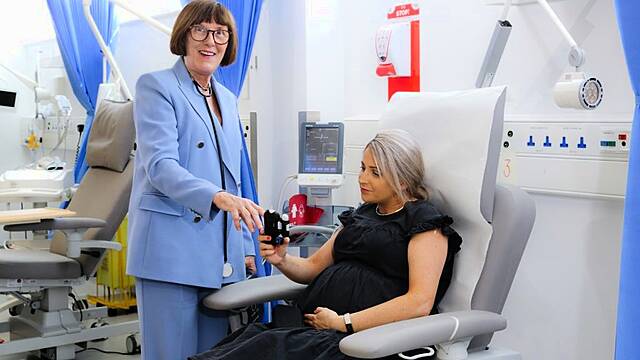The results of an Irish study could help manage a type of diabetes diagnosed during pregnancy, and avoid negative impacts the condition can have on both mothers and babies.
The findings of a trial carried out at University of Galway has been called “a significant step forward” by its researchers, which could help women with gestational diabetes mellitus.
The trial findings indicate that metformin, which is used in the treatment of type 2 diabetes and has been available for over 60 years, is an effective alternative for managing gestational diabetes.
The results are being presented at a conference in Germany and are being published in the Journal of American Medical Association on Tuesday.
Gestational diabetes, characterised by elevated blood sugar levels during pregnancy, affects almost three million pregnant women worldwide every year.
It can pose health risks for both mothers and their babies.
The randomised trial involved 535 pregnant women, with 268 receiving metformin and 267 a placebo.
98 per cent of women remained in the trial until delivery, with 88 per cent completing the 12-week post-delivery follow up assessment; 4.9 per cent of women discontinued the medication due to side effects.
It found that women assigned to metformin were 25 per cent less likely to need insulin, and when insulin was necessary, it was started later in the pregnancy.
The trial results also found that fasting and post-meal sugar values in the mother were significantly lower in the metformin group at weeks 32 and 38.
Delivery occurred at the same mean gestational age (39.1 weeks) in both groups, and there was no evidence of any increase in preterm birth (defined as birth before 37 weeks) among those who received metformin.
Infants born to mothers who received metformin weighed, on average, 113g less at birth, with significantly fewer infants classified as large at birth, or weighing over 4kg (8lbs 8oz).
There was a slight reduction in infant length (0.7cm), but the study found no other significant differences in baby measurements.
The study also found no differences in adverse neonatal outcomes, including the need for intensive care treatment for newborns, respiratory support, jaundice, congenital anomalies, birth injuries or low sugar levels.
There were also no variations in rates of labour induction, caesarean delivery, maternal haemorrhage, infection or blood pressure issues during or after birth.
Fidelma Dunne, Professor of Medicine at University of Galway, is to present the results at the 59th annual meeting of the European Association for the Study of Diabetes in Hamburg on Tuesday.
“While there is convincing evidence that improved sugar control is associated with improved pregnancy outcomes, there was uncertainty about the optimal management approach following a diagnosis of gestational diabetes,” Prof Dunne said.
“In our pursuit of a safe and effective treatment option, we explored an alternative approach – administering the drug metformin.
“A previous trial compared metformin to insulin and found it to be effective, yet concerns remained, especially regarding preterm birth and infant size.”
Prof Dunne, who is also a consultant endocrinologist at Saolta University Health Care Group, said that traditionally, gestational diabetes was managed through dietary advice and exercise.
Insulin was then introduced if sugar levels remained suboptimal.
“While effective in reducing poor pregnancy outcomes, insulin use is associated with challenges, including low sugars in both the mother and infant which may require neonatal intensive care, excess weight gain for mothers, and higher caesarean birth rates,” she said.
“For mothers with gestational diabetes, they are also at greater risk of high blood pressure and preeclampsia.
“Babies born to mothers with gestational diabetes face their own set of risks, such as excessive weight at birth, birth injuries, respiratory difficulties and low sugar levels after delivery, potentially requiring admission to neonatal intensive care.
“Gestational diabetes also increases the lifetime risk of diabetes for these mothers and their children.
“In addition, mothers have an elevated lifetime risk of cardiovascular disease. Furthermore, low and middle-income countries bear a significant burden of gestational diabetes cases.”







